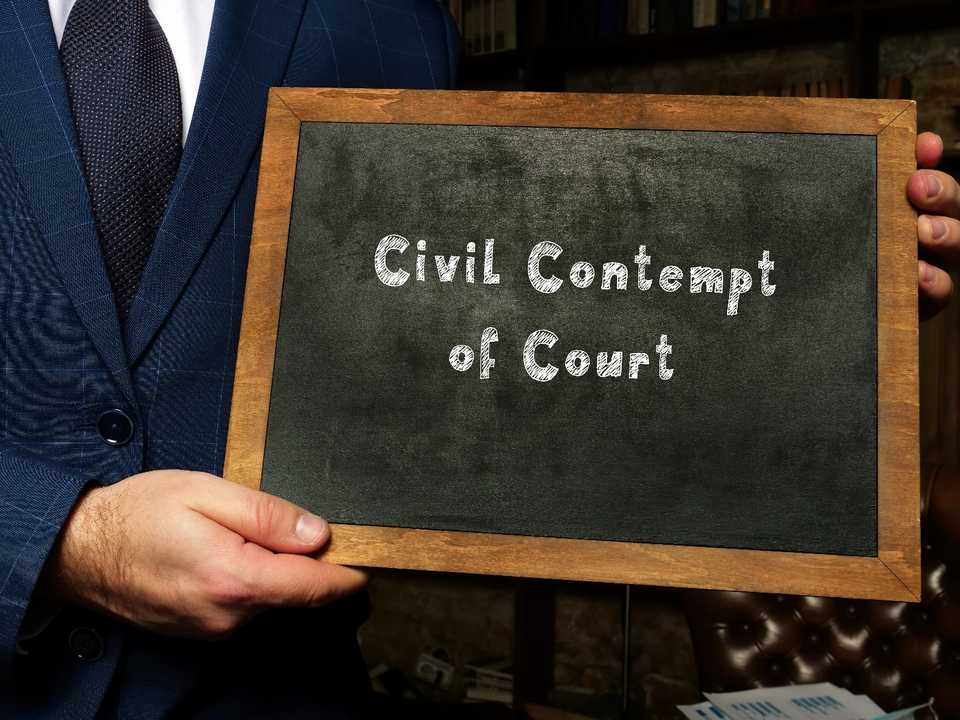Did you successfully obtain a judgment from civil litigation ? Has the other party refused or failed to pay?
After much time and money spent on your case, not being able to collect the money owed you can be very frustrating.

There are enforcement proceedings available to enforce judgments awarded by the courts but they differ from province to province in Canada.
Learn how you can enforce a judgment with a lawyer in Ontario and fight for your rights . Read on to know your next steps.
Compare skilled lawyers in your area to help you enforce a judgment using a short online form, free of charge!
What happens if someone refuses to pay after a court judgement?
Winning a court judgment through civil litigation may not be the end of your fight. What happens if the other party refuses to pay the court judgment?
When a judge rules in your favour and issues a judgment, it is up to you to collect your compensation. What should you do next?
- Schedule an enforcement hearing to know the debtor’s financial situation and obtain an order for the schedule of payments.
- Go to the court registry for an order for the seizure and saleof any personal property belonging to the debtor. Hire a court bailiff to execute the order to take and sell the debtor’s property.
- Get a garnishment order from the court. This requires a third party who owes money to the debtor to make payments to you from wages, bank accounts, or trusts.
- If a schedule of payments was issued by the court and the other party fails to do so, you can request adefault hearing wherein additional penalties may be imposed.
Good lawyers can assist with large judgment enforcement and arbitration award collection or help defend debtors’ rights.
Find the right lawyer from JuriGo to assist you today simply by filling out our short online form!
Enforcing a Court Judgement: Available Remedies

To enforce an Ontario court judgment, certain regulations apply to:
- Small Claims Court if filed in Ontario;
- Bankruptcy Insolvency Act
- Wages act if the enforcement will use wage garnishment
- Personal Property and Security Act
- Other laws depending on the nature of the case and the type of judgment
What are the types of enforcement?
It is important to know the technique of enforcement that will be most appropriate based on the court judgment. Some of the most popular methods are:
- Writ of seizure and sale of property
- Writ of seizure and sale of land
- Garnishment of wages
- Writ of Possession: The creditor may ask for permission from the court by way of an order to possess the property.
- Writ of sequestration and receivership: The Sheriff can take possession and hold the property of the debtor and collect and hold income from the property.
A writ of seizure can be filed with the Sheriff against the debtor’s assets. In the case of a wage garnishment, a creditor can send a notice of garnishment to the company or person holding the assets of the debtor such as an employer, bank, or trustee.
It is critical to have very good legal representation to enforce a judgment in Ontario to protect a creditor’s rights or to defend a debtor’s rights.
Get expert legal advice on what to do about enforcing a court judgment by finding the best lawyer to help you in the JuriGo network. Just fill out our short online form with no obligation!
Debts Not Released by Order of Discharge in Bankruptcy
Based on Section 178 of the Bankruptcy and Insolvency Act, RSC 1985, c B-3 , some debts are not released by an order of discharge from a bankruptcy.

These include awards of damages by a court in civil litigation related to:
- Bodily harm that is intentionally caused
- Wrongful death
- Sexual assault
- Debts or liability due to fraud, embezzlement, or misappropriation while holding a fiduciary position.
Consult a lawyer from JuriGo whether the debt owed to you falls within these exceptions and get legal assistance in the enforcement of these debts.
What is a civil contempt order?
In general, persons with debts no longer go to prison. However, a debtor must abide by enforcement procedures under the law, including Ontario’s Rules of Civil Procedure.
When a debtor against whom a judgment was issued does not comply, a civil contempt order can compel such debtor to pay, including instances wherein the debtor conceals or disposes of property with the intent to defraud.
Under Rule 60.11 of the Rules of Civil Procedure, a contempt order to enforce an order requiring a person to do something or abstain from doing an act (not just the payment of money) can be issued by the court.
The Rules of Civil Procedure demand a debtor attend an examination in aid of execution and present necessary documents in his possession or control. If the debtor fails to do so or fails to answer questions during the examination, the creditor can seek an order of contempt.
Consequences of a Contempt Hearing
A contempt hearing must be taken seriously. The debtor is given the opportunity to explain his actions or failure to comply. A judge may order the debtor to attend an examination hearing and can also issue an order to put you in jail for up to five days for contempt of court . If you do not attend the contempt hearing, orders may also be made against you.

The judge will order the clerk to issue a Warrant of Committal [Form 20J] to the police authorizing them to take the individual (the debtor) to the nearest jail and hold him for the time indicated in the warrant.
A lawyer is the best person to give you legal advice concerning a contempt hearing or order.
Contact a good lawyer in your area using our short online form today to get help with enforcing a judgment in Ontario or defending yourself against a contempt order.
Orders of Compensation under the Criminal Code
Under the Criminal Code of Canada, a judge of the Ontario Court of Justice or Superior Court of Justice can order an offender to pay:
- Through a restitution order (Section 738 or 739)
- A condition or probation (Section 732.1)
- A condition of a conditional sentence (Section 742.3)
If an offender fails to settle the payment, the victim can file an order at the Small Claims Court (if the amount is $35,000 or less). No fee is charged for the filing of a Criminal Code order for issuing and filing an enforcement order. However, the enforcement office can charge disbursement expenses.
If action is filed with the Small Claims Court, the order can no longer be enforced by the Criminal Court where the original order was made.
How lawyers can help with collection of judgements
Lawyers will consider if the circumstances of the case are included in the following statutory provisions:
Absconding Debtors Act, R.S.O. 1990, c. A.2
The property of an absconding debtor can be seized to pay for his debts.
Assignments and Preferences Act, R.S.O. 1990, c. A.33
This Act has statutory authority:
- to declare as void any acts of collusion with a debtor by a person about to become insolvent in order to hinder or delay or prejudice other creditors as a whole or in part.
- to void any gift, assignment, transfer, or payment of chattel, goods, stocks, shares, or real or personal property by a person unable to pay debts or is about to become insolvent to defeat or prejudice other creditors and give preference to one or more creditors
- to follow the funds arising from property fraudulently transferred in the above circumstances
Fraudulent Conveyances Act,R.S.O. 1990, c. F.29
This Act includes statutory authority to void, as against such persons and their assigns any conveyance of real or personal property, etc. to defeat, delay, or defraud creditors of their lawful actions, lawsuits, debts, accounts, damages, penalties, and forfeitures.
Lawyers work efficiently using results-oriented techniques to collect judgment debts and enforce orders issued by the court.
Hire a lawyer from JuriGo to assist with the enforcement of judgment orders in Ontario to protect your rights and get peace of mind.
Is it necessary to hire a lawyer to enforce a judgment in Ontario?

You must remember that you don’t want to spend a ton of money chasing after “bad money” after you sue somebody and win a judgment.
To get your money, you need to understand the financial situation of the debtor. You can exert a lot of effort and spend money with enforcing a judgment and still not be able to collect from an insolvent debtor.
Experienced and skilled lawyers in Ontario from the JuriGo network can help by evaluating the details of your judgment order, determining the best recovery and collection methods, and using available legal remedies to enforce the judgment.
For this reason, it is best to get legal expertise to have a judgment enforced in Ontario in the shortest possible time.
Steps to take if the Debtor Defaults on a Scheduled Payment Order
When a debtor fails to make a payment based on a scheduled payment order, you can file a Notice of Default of Payment and an Affidavit of Default of Payment. The periodic payment order ceases 15 days after you serve the debtor with a notice of default of payment unless you decide to waive the default after speaking to the debtor.
In such cases, you must file a waiver of default with the court within the 15-day period . If you do so, you can pursue another enforcement method such as seizure of property.
An experienced lawyer from the JuriGo Network can help you take the appropriate steps when a debtor defaults on a payment order.
Filing a Notice of Garnishment to Enforce a Judgement
If a court ruled in your favour but you have not received payment, you can demand money owed by a debtor from someone else who holds money for him.
This is referred to as garnishment which applies mostly to salaries or wages and bank accounts.

The Rules of the Small Claims Court contains the rules for garnishment.
Under Section 7 of the Wages Act , the amount of wages that can be garnished is restricted. There are also exceptions to garnishment. For example, social assistance and pension payments cannot be garnished, as well as employment insurance.
Garnished funds must be deposited in a financial institution . Additional steps are also necessary to garnish wages of federal government employees, members of the Canadian Armed Forces, or employees of provincial governments.
To garnish wages, it is important to know the name and address of the employer. If you are garnishing a bank account, you must also know the bank branch and address of the bank of the debtor.
You need to have the notice of garnishment issued by the Court within 6 years after the court made the order you are trying to enforce.
Steps to Get a Garnishment Order
- Accomplish the Affidavit for Enforcement Request [Form 20P] which details the following:
- Facts of the court order being enforced;
- Amount still owed;
- The other party (garnishee) that holds money for the debtor
- Address of the garnishee
- The garnishee must be served the notice (bank, employer, etc.) and the debtor (within 5 days of serving the garnishee).
- Fill out the Affidavits of Service (Form 8A) with the court to prove that both the garnishee and debtor have received the notice.
- The garnishee will pay the money to the court.
Wage garnishment to recover payment: Hire a lawyer in Ontario
As you can see, the enforcement of a judgement can be as difficult as filing the claim in the beginning.
You will benefit significantly from the expertise of a lawyer to handle the paperwork and compliance with all the legal requirements to enforce a judgement.
Our partners at JuriGo will gladly assist you with the best legal remedies to your situation.
Find the best lawyer to help you collect compensation or enforce a court judgment by filling out the short online form, free of charge!
